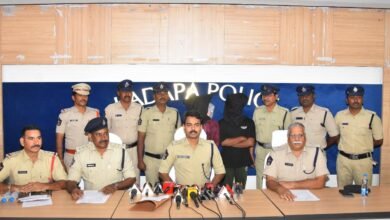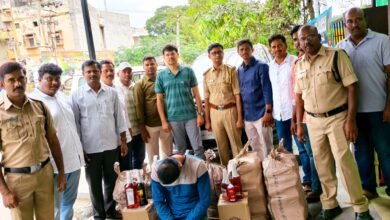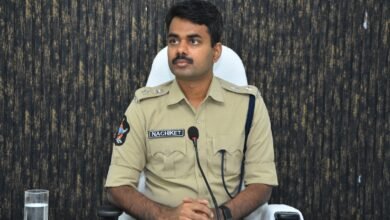Intelligence reforms, anti-corruption measures, and police independence stressed at RPC meet
By Doruvu Paul Jagan Babu: Assistant Chief Editor

Rajahmundry – Andhra Pradesh: At a weekend party meeting held at the Rashtriya Praja Congress (RPC) headquarters on Sunday, RPC founding president Meda Srinivas urged the central and state governments to implement significant reforms in law enforcement. He emphasized the need to separate criminal investigation from the general police, enhance intelligence agencies, and establish village committees to create a crime-free society. The meeting was presided over by ARPC senior secular Pendyala Kamaraju and attended by several prominent RPC seculars.
Intelligence agencies must improve performance
Meda Srinivas expressed concern over the declining efficiency of intelligence agencies in collecting criminal information. He criticized the inability of intelligence personnel to leverage modern technology effectively and pointed out their failure to identify threats posed by drug lords and counterfeit goods gangs. He lamented that intelligence officers often prioritize routine attendance over their core responsibilities, leading to increased crime rates. He urged the government to provide intelligence agencies with greater autonomy, free from political interference, to allow them to operate with effectiveness and integrity.
Separation of criminal investigation and general policing
Highlighting the need for structural reform, Srinivas advocated for a clear separation between criminal investigations and general police duties. He argued that the general police force is burdened with multiple responsibilities, leading to inefficiencies in solving crimes. According to him, creating a specialized investigative wing would improve the quality of criminal investigations and ensure that justice is served more efficiently.

The role of Anti-Corruption Bureau (ACB) under scrutiny
Srinivas criticized the performance of the Anti-Corruption Bureau (ACB), stating that despite working alongside the police, corruption remains rampant. He noted that ACB primarily targets lower-level employees, while higher-ranking officials involved in corruption often escape scrutiny. He also pointed out that government offices, including those of the Sub-Registrar and Tehsildar, are plagued by bribery, rendering anti-corruption efforts ineffective. He further claimed that Rs 100 crores are wasted annually on the management of the anti-corruption department, without significant results.
Need for independent anti-corruption wing
According to Srinivas, a major reform would be to establish the anti-corruption wing as an independent entity, separate from the police department. He argued that political interference has rendered anti-corruption efforts weak and ineffective. He also noted instances where police officers caught in corruption cases were later reinstated in ACB, undermining public trust in the system.
Political pressures affecting police functions
Srinivas stressed that political pressures exacerbate the psychological stress among police personnel, leading to illnesses and suicides. He urged higher authorities to treat lower-level officers with respect and provide them with the necessary support to enhance their morale. He further suggested appointing a dedicated protocol police force to handle political and VIP duties, allowing the general police force to focus on maintaining law and order.
Establishing village committees for crime prevention
To strengthen crime prevention efforts, Srinivas proposed the formation of village committees. He argued that fostering a closer relationship between the police and the public would create an environment of trust and cooperation, ultimately leading to reduced crime rates. He also suggested that the police should be responsible only until an FIR is filed, while a specialized investigative department should handle further criminal investigations.
Stronger commitment to law enforcement needed
Srinivas warned that merely viewing policing as a salaried job would have severe consequences for society. He called for serious introspection and reforms in law enforcement strategies. He urged the government and police to explore innovative measures to curb crime and ensure the safety of citizens.
Key attendees at the RPC meeting
The meeting was attended by RPC seculars, including Sarvasree Simma Durga Rao, Lanka Durga Prasad, Dudde Trinad, Vardhanapu Sarath Kumar, Akula Manikanth, Mortha Prabhakar, Valli Srinivasa Rao, Doshi Nishant, Vadapalli Jyotish, Gudla Sai Durga Prasad, Basa Sonia, Sunkara Venkata Bhaskara Ranga Rao, Challa Sambasiva Rao, Adapa Seshagiri, Masa Appamma, Kudupudi Parthasaradhi, Doshi Moksha, and Doshi Sujal.
Srinivas reaffirmed his belief that with proper reforms and dedicated efforts, law enforcement agencies can restore public trust, improve efficiency, and contribute to a safer and more just society.









